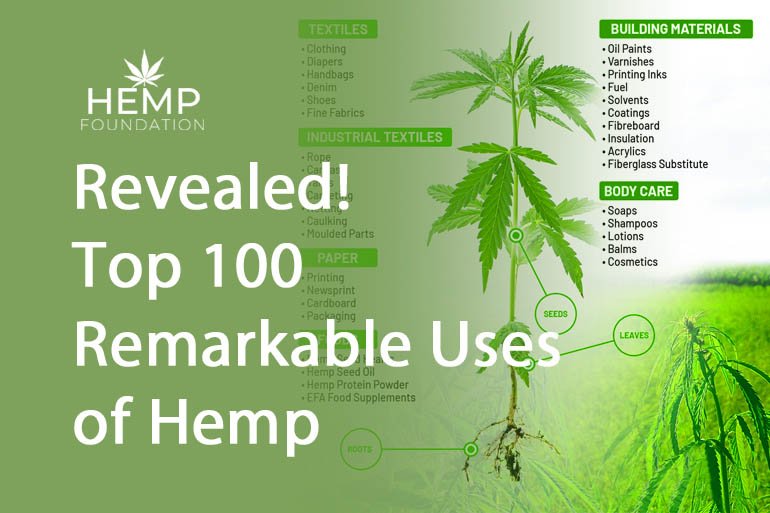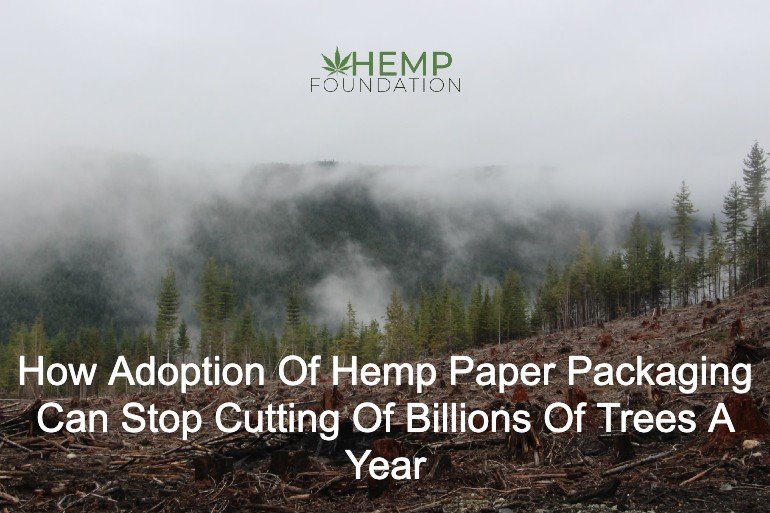Revealed! Top 100 Remarkable Uses of Hemp
Hemp is a part of the Cannabis Sativa plant and was first used in China and the Middle East in 8000 BCE. Having been around for millennia, hemp has quite a bit of history.
Throughout generations, its growth has been marked with cultivation and how its various uses became incorporated in our daily lives.
The purpose of this guide is to outline the many uses of hemp. Before we dive into its benefits and uses, let us know a bit more about hemp.
What is Hemp?
Let’s get something clear right off the bat – hemp is nothing like marijuana.
Yes, they are both parts of the cannabis family but are very different.
For starters, you cannot get high on hemp as its tetrahydrocannabinol (THC) is less than 0.3%. It is a fast-growing plant that takes up to 3 to 6 months grows at a height of almost 15 ft.
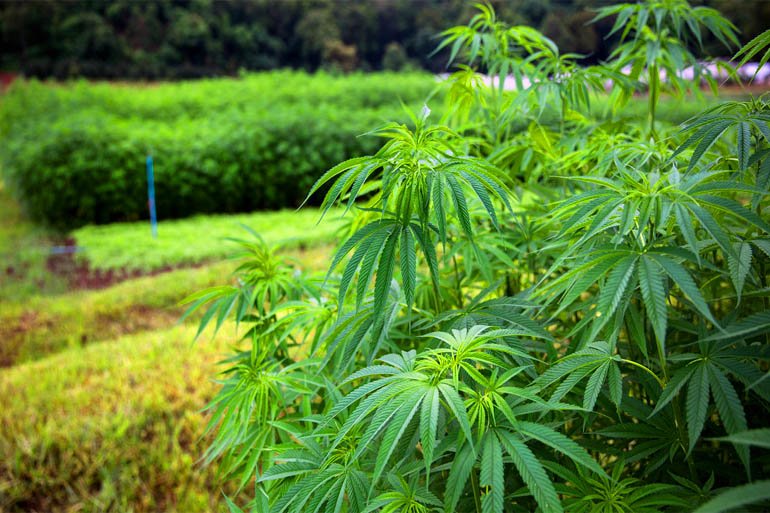
Here’s to let you in on a few little known facts:
Did you know that even the US Presidents George Washington and Thomas Jefferson used to
grow hemp?
Another interesting fact: the first 10$ bill in the year 1914 was printed on hemp.
There was also a picture of farmers plowing hemp on the backside of the note.
Cultivation of Hemp
Due to selective breeding, hemp can thrive in almost any kind of environment. But the ideal conditions for cultivation are in warm areas with well-drained soil, rich in organic material.
Currently, in the US, hemp farming is one of the most profitable textile and industrial crops.
For years, hemp had been vilified and put under scrutiny because of its connection to the psychoactive plant marijuana. But with the 2018 Farm Bill, industrial hemp has been made legal on a federal level after years of prohibition.
Top 50 Uses of Hemp
Incredibly versatile, unique, and durable, hemp has been around for centuries and has a wide variety of uses. It is only recently after years of prohibition that hemp is being used to its full potential. This guide will help you browse through the top 50 uses of hemp.
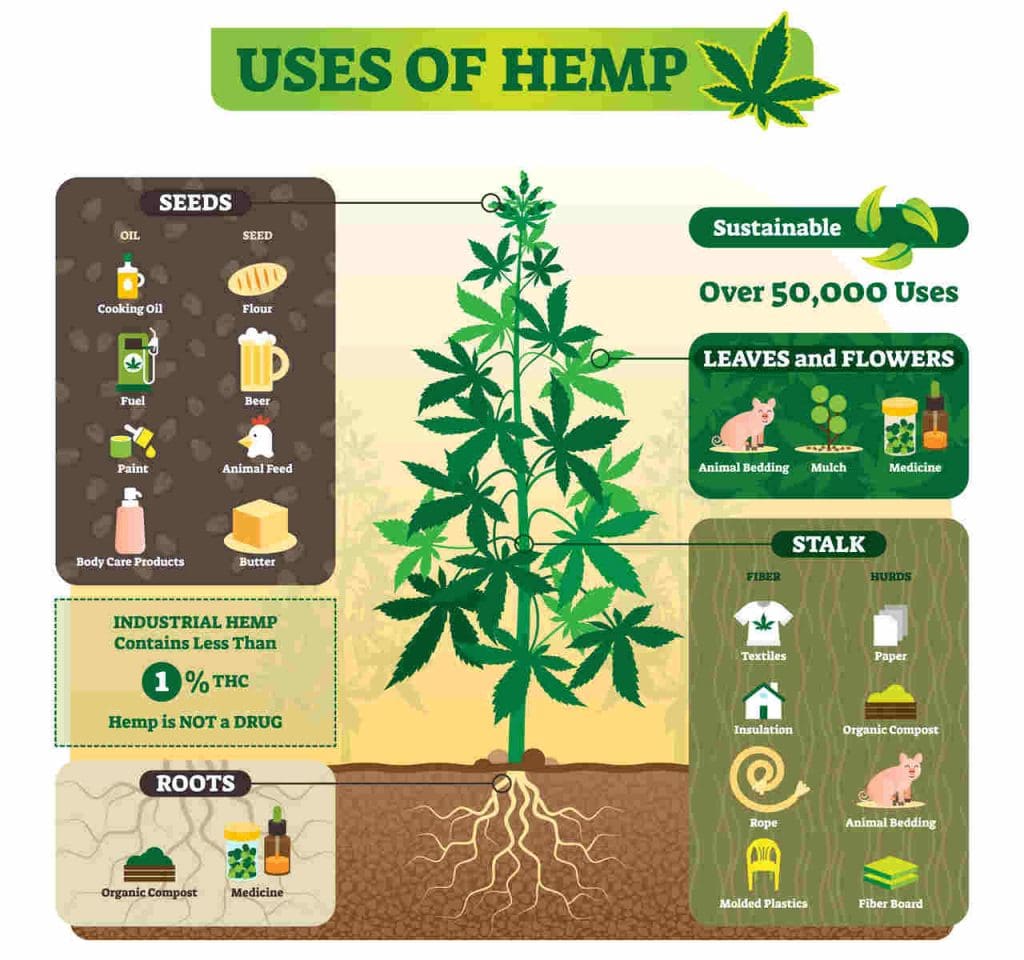
Hemp Seeds: Superfood:
Considered to be a superfood, protein-rich, and high in fiber, hemp seeds have tons of benefits. These seeds have many environmental and economic benefits since their potential for industrial use is incredible.
The whole hemp seeds can be processed further to remove the outer shell. This, in turn, is used to extract oil from the seed or ground it into flour or protein powder. There are a variety of hemp seeds, which can be purchased in their shelled, ground or split forms.
Some of the popular forms of seeds are the hulled hemp or ‘hemp hearts,’ the whole hemp, raw organic hemp, and the toasted hemp. Be it in any form, all of these types of hemp seeds can be incorporated in our daily lives and diets as simple measures to live a healthy life.
Reduced Risk of Cardiovascular Disorders:
Rich in arginine, which is an amino acid that facilitates the production of nitric oxide, hemp seeds are beneficial in reducing cardiovascular disease. There is a natural balance of cholesterol, fatty acids, and saturated fats in the seeds.
All of these are important in a balanced quantity to maintain a happy heart. So, to enjoy a reduced risk of cardiac disease, include hemp seeds or hemp seed oil in your daily dietary routine.
Aids Digestion:
Do you suffer from bowel problems? Is the indigestion part and parcel to your life?
If your answer is yes to both of those, they might want to include hemp seeds in your diet.
Rich in soluble and insoluble fiber, hemp hearts help to regulate digestion and clear out the gut. Since the seeds are also high in fiber, they also help relieve constipation.
Cures Cancer:
No, hemp cannot completely cure cancer. Hemp is indeed a miracle plant but not that miraculously to cure cancer!
But what hemp can actually do is act as a supplementary form of therapy for cancer patients and relieves some of the symptoms that come with the disease and its treatment.
Hemp seeds act as antioxidants and contain high levels of Vitamin E or tocopherol. These help in the removal of something called free radicals, which is produced as a result of cellular metabolism.
Free radicals are harmful as after oxidation, they tend to mess with the quality of cells. Consuming hemp seeds help to combat these and also fights against colon cancer.
Cures Skin Conditions:
With a 3:1 ratio of omega 6 to omega 3, hemp seeds contain polyunsaturated and essential fatty acids. These are good for skin as they reduce the risks of skin disease and provide people suffering from eczema relief. Equally nutritious is the oil extracted from hemp seeds, which repairs dry skin and promotes the overall improvement of the skin.
Insomnia:
Are you a night owl, whom sleep eludes? You have tried everything to get some sleep, but nothing seems to work. Instead of opting for a prescription drug to help you sleep, why not choose something more natural? In that case, hemp seeds are your answer.
The seeds are high in minerals like magnesium, which helps to provide relief for insomnia. It releases serotonin, which after traveling to the brain, produces melatonin. This helps in relaxing the nerves in the body and aiding sleep.
Hormone Balance:
Women between the ages of 12 to 50 either suffer from premenstrual syndrome (PMS) or menopause. Symptoms like mood swings, anxiety, and depression are the warning signs of hormonal imbalance. To combat these, the consumption of hemp seeds is advisable.
This is because hemp seeds tend to regulate these hormones, which are also primary factors in the ups and downs when it comes to weight and appetite. Imbued with Gamma-Linolenic Acid (GLA), the hemp seeds regulate hormones for thyroid and pancreas.
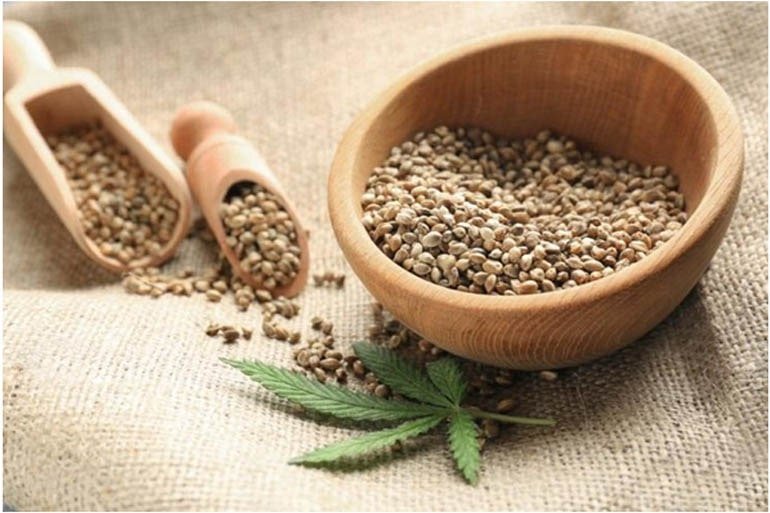
Anti-Inflammation:
As per recent findings in the ACS Omega, it states that hemp seeds have immunomodulating, anti-aging and antioxidant effects. The composition of hemp seeds is perfectly balanced in terms of omega 3 fats and Gamma Linolenic Acid, which thus helps to reduce chronic inflammation naturally. This also helps to fight against chronic diseases like fatty liver and arthritis.
Hemp Milk:
Extracted from hemp seeds, hemp milk is derived by first blending the seeds with water and then by straining the mixture. The process of making hemp milk is similar to that of making nut milk.
Packed with healthy fat and protein, hemp milk is low in calories and is ideal for vegans and lactose-intolerant people. It has a nutty and earthy taste. So, if you are planning to make a switch to a healthier lifestyle, why not opt for hemp milk over other plant-based drinks?
Hemp Oil:
Similar to hemp milk, hemp oil is extracted from the seeds by pressing them together. It is high in nutrition and fatty acids, thus making it an excellent source for skin nourishment.
Treats Acne:
Using hemp oil can be beneficial for maintaining skin balance. It is said that the oils tend to affect the sebum glands in people suffering from chronic acne. High in fatty acids, the oil helps to reduce the sebum production in the pores. Thus, clearing or preventing acne from breaking out on the skin.
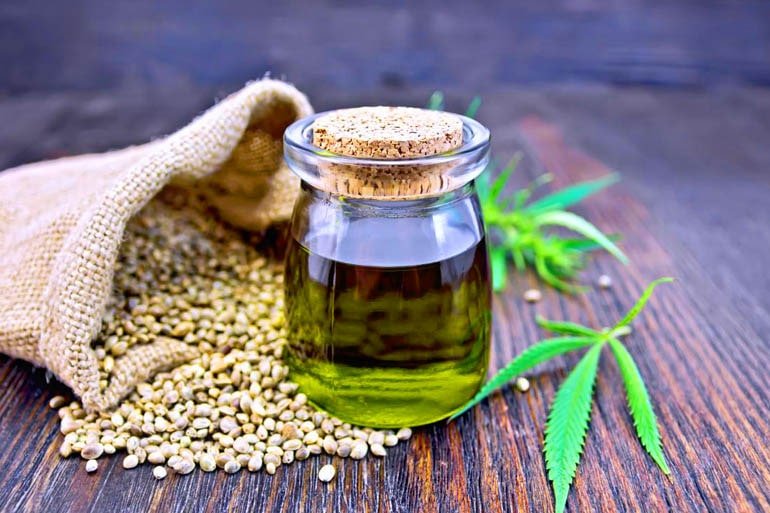
Muscle Relaxant:
Have you been spending a lot of time in the gym? Are your muscles sore from lifting too much weight? Were your answers to all of these? Then you need to start using hemp oil. Its anti-inflammatory properties help relieve muscle tension and relax them.
Neurologically Important:
Our brains function on healthy fats, and consuming hemp seed oil is good for the proper functioning of the brain. Because of its high fatty acid content, hemp seed oil also contains polyphenols, which helps protect the brain.
Incorporating hemp seed oil into your diet will help with neurological conditions like Parkinson’s disease, Alzheimer’s disease, neuropathic disorders, or multiple sclerosis.
Hemp Flour:
It’s a by-product of cold-pressed hemp seeds. If you are lactose-intolerant or vegan, then hemp flour is perfect for you. Hemp flour is gluten-free and high in vegetable protein and dietary fibers. It can be used as a substitute over regular flour and can be used for baking.
Hemp Protein Powder:
Similar to hemp flour, hemp protein powder is also derived from cold-pressed hemp seeds. It is a great natural alternative to other protein powders as it is high in protein, dietary fibers, and is gluten-free.
Hemp Tea:
Hemp tea is made from the hemp roots. Initially used during the ancient period but has currently become mainstream. Mainly used for post-natal bleeding, toothache, gout, fever, and ulcer, hemp tea has other beneficial qualities.
Hemp for Body Care:
Other than its medicinal qualities, hemp oil has calming and therapeutic properties. Currently, it is among the popular essential oil and is used in body oils and lotions as well.
Hempcrete:
Before hemp was used for its seeds and oil, it was initially used as a construction material. In recent years, hempcrete, which is a block of concrete like a product, has been in the market and is most commonly used in parts of Europe, where hemp was never illegal.
Hemp Pulp Paper:
Hemp is a versatile and durable plant. It is also comparatively more resistant than the regular paper made from wood pulp. Hemp paper can be recycled 7 to 8 times when the regular ones can be recycled merely thrice.
Producing hemp paper is not cost-effective and is considerably more expensive than regular paper. So, having mass production of hemp paper for printing, packaging, etc. is unlikely.
Biodegradable Plastic:
Changes are being implemented to boycott the environmentally dangerous known to mankind, plastic. To completely eradicate plastic, we need a biodegradable alternative, and what is better than hemp?
Hemp is a usable fiber, and cellulose extracted from it can be used to make a sustainable form of plastics like cellophane, celluloid, and rayon.
Carbon Warrior :
The fashion industry is responsible for tons of carbon emissions in the environment, which thus adds to global warming. Opt for hemp clothing, which is environmentally friendly as it can absorb carbon dioxide from the environment at a faster rate than other plants. Using hemp will help combat climate change.
Requires Less Water :
When compared to cotton, hemp requires a minimal quantity of water. Cotton, on the other hand, requires heavy irrigation, which in turn depletes the limited freshwater resources.
Good for Soil:
Adaptable to any kind of environment, hemp can also grow quickly in any type of soil. Unlike other plants or crops, hemp does not deplete the essential properties of the topsoil and instead restores its vital nutrients.
Minimal Land Use:
Hemp can provide thrice more fiber when compared to cotton and grows in an area almost half as required to cultivate cotton.
Hemp Fabric is Antimicrobial:
The hemp fabric is antimicrobial in nature. Hemp fabric is active against nature microbes and thus has the capability of keeping the odor-causing bacteria at bay.
Durable:
Due to its antimicrobial property, hemp exhibits versatility and durability when compared to other natural textile fibers. One of the major USPs of hemp is that unlike other materials, hemp tends to retain its shape even after multiple uses.
Soft Fabric:
Because of its antimicrobial and durability properties, hemp is a comfortable fabric to wear and can last long.
UV Resistant:
Hemp fabrics are woven tightly so that no sun rays are penetrating the surface material. This is done to protect our skin from the harmful ultraviolet rays, overexposure which can cause skin cancer and other ailments relating to the skin.
Strong Fiber:
Hemp fibers are long and intricately coupled together, thus making it one of the most durable natural materials. Washing activities like tumble are no match when it comes to testing the durability and strength of hemp.
Resists Abrasion:
When compared to other fibers, hemp is less amorphous, thus meaning it can retain its normal shape even after multiple washes and use. Hemp is immune to abrasion.
Absorbs Water:
Hemp clothing is water absorbent, and thus it helps to retain dye colors.
Biodegradable:
Entirely natural, hemp clothing is entirely biodegradable and does not negatively affect the environment.
High-Quality Fiber Production:
Hemp can yield more amounts of fiber than any other plant.
No Chemical Fertilizers:
Hemp does not require any synthetic or harmful chemical fertilizers or herbicides to grow. Using chemical pesticides and insecticides results in soil and water pollution.
Hemp Can Grow Anywhere:
From China to North and South America and even to the Arctic, hemp can literally grow anywhere.
Quick Growth:
Other plants like cotton take a long time to grow but not hemp. It tends to grow at a rapid pace and thus can be harvested twice or more annually.
Toxic Absorbent:
Hemp is a useful natural resource that helps to reduce and eradicate toxic substances from the soil.
Zero Wastage:
Hemp is an efficient resource and is extremely eco-friendly since the whole plant can be used in entirety for its multiple beneficial uses.
Hemp Fuel:
Other than dressing for salads or as an essential ingredient in beauty products, hemp seed oil can be used to produce non-toxic diesel fuel. This is extremely good for the environment as it prevents air pollution. It is said that hemp can become a prime source of ethanol fuel.
Hemp as Pet Food:
Hemp has many healthy proteins, which can be used for pet food. Consuming hemp food makes the cat’s coat healthy and shiny, and as for cows, dogs, and horses, hemp can be used as a dietary supplement.
Hemp for Animal Bedding:
Apart from being used as pet food, hemp can also be used for animal bedding for animals like horses, rats, guinea pigs, and other rodents. The hemp bedding is made out of hemp shives, which is found in the plant stem.
Hemp for Cattle Feed:
Other than pet food, hemp is also healthy and nutritious as cattle feed. Researches have showcased that hemp can elevate the performance and health of animals.
Hemp in Cosmetics:
Hemp is a significant hit in the cosmetic industry as well, with applications in skincare, haircare, and nail care. It can be used to make organic shampoos, balms, lipsticks, body lotions, deodorants, etc.
Hemp in Medication:
Hemp can be used as a supplementary therapy to relieve symptoms or prevent the onset and sometimes even cure a particular disease. Some of the ailments that hemp can help in are acne, liver disease, cancer, nausea, sleep disorders, anxiety, depression, asthma, etc.
Hemp Fiber is Hypoallergenic:
As mentioned previously, hemp fiber is antimicrobial and is UV resistant, so it being hypoallergenic comes as no surprise.
Hemp as Construction:
Hemp has the potential to replace wood and other materials to build homes and buildings in general.
Hemp in Rope Making:
Hemp is strong, durable, and flexible and water absorbent, thus making it the ideal fiber for rope making. In the earlier times, hemp ropes were used by the Navy, during shipping trade and even in fishing.
Hemp as Fabric:
Fun fact: Did you know that the first American flag and the first pair of Levis jeans were made from hemp? It is interesting to know that hemp has been around for a long time. When blended with other materials like organic cotton or recycled nylon, hemp makes some comfortable pieces of fabric.
Hemp as Textiles:
Hemp can be used for industrial use like making netting, canvas, carpeting, along with apparel, bags, and shoes, etc.
Hemp as Food:
Due to its high nutrition content, hemp is also suitable for us to incorporate into our diets, be it as a smoothie or as bits of snacks.
Phew! There go the ultimate 50 uses of hemp. So have you stuck around until now? Great, if you have, because we have some bonus info for you!
50 Other Uses of Hemp:
Hemp can also be used in the following different ways:
|
|
|
|
|
|
|
|
|
|
|
|
|
|
|
|
|
|
|
|
|
|
|
|
|
|
|
|
|
|
|
|
|
|
|
|
|
|
|
|
|
|
|
|
|
|
|
|
|
|
And there you go folks; you now have the complete list of the top 100 uses of hemp. So, switch to hemp for a better living.
Conclusion:
As you can see for yourself, hemp has the capability of replacing a ton of other raw materials that are not so eco-friendly.
Think of the number of trees that we could save if we opted for hemp for paper and textiles. Hemp has the potential to be recycled more than thrice and is also good for the environment.
Unfortunately, even in today’s day and age, hemp is still illegal in some states due to its stigma of being associated with marijuana.
Now, the challenge lies with us. It is up to us to educate others regarding hemp and its various uses and how switching to hemp regularly will tremendously change one’s lifestyle.

